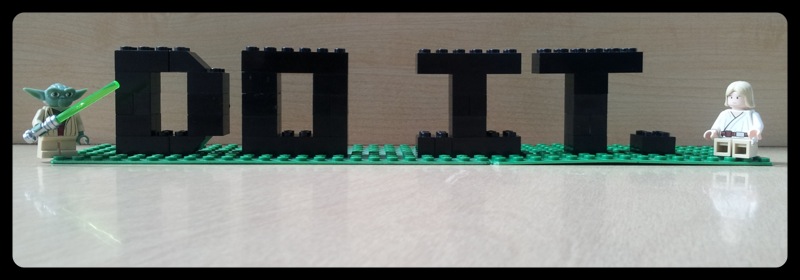
If you're going to unschool, do it now and do it well.
(Lego art by Robert and Robbie Prieto; photo by Colleen Prieto
A mom wrote:
== He watched South Park, listens to music on his ipod, plays video games on his xbox but has NO INTEREST in learning even the basics.==Amy Carpenter responded:==They seem to want passive stimulation.==
Seeing TV and video games as passive stimulation is becoming a very foreign concept to me.My husband majored in Communication Arts and Sciences, with a focus on Video Production when he was an undergrad. From our early days together, he was always pointing out *how* TV shows and movies were made—how the perspective was framed, how the editing decisions worked with the overarching philosophy, as well as "how did they get that shot?" questions. That's part of our everyday conversation when my family watches TV together.
As a writer, I'm always looking at the story behind the story as well. How is the story structured, what are the creators accomplishing by giving this action to that character, and so on. We talk about those factors whether we're playing video games and while we're watching TV shows and movies. Our understanding is complex and is focused on the whole story system, instead of the details and the basics.
Recently, I skimmed through a book on the video game industry. That got me thinking more about the process behind putting together video games—how the graphics are rendered, the project management aspect, how the dialogue is written to be flexible enough to sound relevant at various stages of the game, how the process of creating the story is changed by adding interactivity. Fisher (almost 10) has a couple of those "Choose Your Own Adventure" books, and we were talking about the ways in which video games would be much more complex to create than those books are.
Our whole family loves music. My husband scours the library and out- of-the-way places for new music and brings it home. He makes compilations of the best stuff that he finds. We play the compilations in the kitchen while we're all hanging out together, and there are some songs that Fisher is just taken with. He dances, he hums—I can see him thinking about how the music is put together, and why it speaks to him.
Given this interest in music, we recently took Fisher to a Blue Man Group concert—his first real "grown-up" show. Again, I could see all the connections being made—he watched how the instruments were being played, listened to how the sounds and the rhythms came together, jumped and bopped his head and let it all come together inside of him. His knowledge and awareness of music is growing deep and wide—it's not about "the basics," but about a gestalt, a holistic, systemic approach.
When you ask what component you are missing, this is what I keep coming up with. Are you looking in the wrong places? Are you looking for the basics when in fact, your son's knowledge and understanding is deep and wide and whole? What you see as "basic" are just a few Lego pieces that he'll fill in as he goes—but in looking for those, are you missing the incredibly large, whole creation that he's built up?
For us, the adults in the house blend our own experience and knowledge with what our kids seem to like doing. We start where they are—we get into it and appreciate it and enjoy it. Is it possible that your son thinks he doesn't have hobbies and interest and passion because of your attitude that what he was doing didn't count as such? Because *you* saw it as passive?
For us, right where our kids were—loving music and TV and video games—was a great starting place for more. Going to concerts, finding out how different bands have influenced each other, figuring out how people have made the movies they've posted on YouTube, researching FAQs, talking with other gamers, looking up weapons that are used in the video games, playing the music we've heard in video games, pretending and finding new connections through our pretend games, talking through the logic of different strategies, looking up actors on IMDB—all of this keeps leading to more and more learning about how the world works, about how the creative process works.
I just keep looking for where "passive" comes into this—and I'm not finding it. There is an aspect of observing, of letting the experience fill us and wash through us as we consider how to use it, how to store it and bring it into our worldview. But it's not at all passive.
Peace,
Amy
[arcarpenter...]

If you're going to unschool, do it now and do it well.
(Lego art by Robert and Robbie Prieto; photo by Colleen Prieto